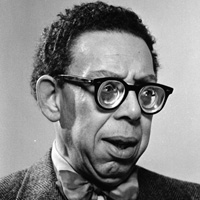Robert Hayden - Biography and Works
Robert Hayden was an African-American poet, essayist, and educator, born in the Paradise Valley Slum section in Detroit. His father left his mother before his birth and after his birth, his mother gave him to the family of Sue Ellen Westerfield and William Hayden. His childhood was like a nightmare for him. He was brought up in an environment of anger, fear and suffered beatings from the foster parents. All these childhood pains and sufferings resulted into the devastating bouts of depression later in his adult life.

Robert Hayden (1913-1980)
Hayden was a voracious reader. He explored the Black history and folk culture. Hayden's work was the resource for the ready-made use of black vernacular and folk speech. With the publication of Heart-Shaped in the Dust in 1940 he freed himself from the agitprop and demonstrated his protest in poetry. It was taken as the greatest step for the African American writer who cannot speak for themselves, protested the trend of sophistication in the poetry. He became the voice for the pain and agony of the slaves that was absent in the literature of his contemporary African American poets. "Runagate, Runagate" narrates the story of Harriet Tubman's escape from slavery, and “Middle Passage" pronounces the distresses of the journey of caught slaves to the slaveholding America with strong depth and power.
In 1941, he enrolled himself in the University of Michigan and won a Hopwood Award. He got a master’s degree under the guidance of W.H. Auden. He became the University teacher in the University of Michigan for three years, then he went to Fisk University and taught there for 23 years. He was appointed as the Consultant in Poetry to the Library of Congress in 1976 and became the first African American to be in that highest honorary post, which later renamed as the Poet Laureate of America. Hayden was also featured in Postage Stamp in a pane of 10 Twentieth Century Poets in 2012.
Though he was raised as a Baptist, later in his life, he became a Baha’i and married a Baha’i lady called Erma Inez Morris. His religious faith influenced his much of the poetry. He also penned some political poetry that includes a sequence on the Vietnam War.
